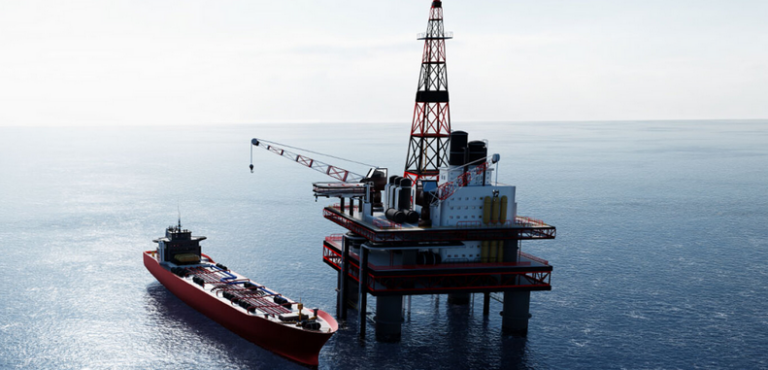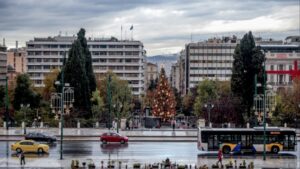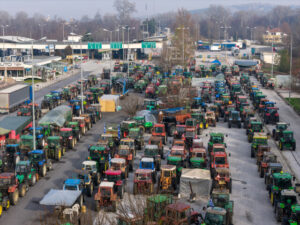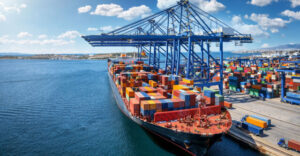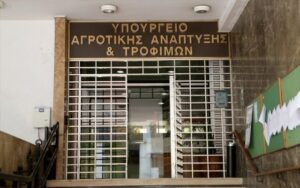An interesting discussion took place within the framework of the 9th Delphi Economic Forum held in Delphi, about the challenges and opportunities for shaping the energy mix, with a focus on maintaining energy independence and security in the transition to clean energy.
This discussion involved Deputy Minister of Environment and Energy, Alexandra Sdoukou, Managing Director and Country Manager of Energean in Greece, Katerina Sardi, CEO of DESFA, Maria Rita Galli, CEO of HelleniQ Upstream, HELLENiQ ENERGY, Tasos Vlassopoulos, Secretary General of the East Mediterranean Gas Forum, Egypt’s Osama Mobarez, and Managing Director of Fannon Global Advisors, USA Frank Fannon. The discussion was moderated by the Academic Director at the Hellenic Energy Forum, Michalis Mathioulakis.
Mrs. Sdoukou referred to the progress of the hydrocarbon exploration plan in Greece, noting that seismic surveys in the licensed areas were completed by 2023, and the analysis of the results is currently underway. She emphasized, “Never before in post-war Greece have we had such extensive seismic surveys.” She expressed her belief that once the analysis stage is completed, companies will be able to decide on exploration drilling in 2025, aiming for the first drills to take place sometime in 2026.
Responding to a question about the use of natural gas in the context of the green transition, Mrs. Sdoukou posed the question, “If we indeed have natural gas production, do we prefer to import or exploit our own reserves?” She then reminded of the steps taken in Greece and the European Union towards the green transition.
She also reiterated the government’s concrete support for drilling plans, collaboration with businesses, and efforts to facilitate them in licensing and related procedures. She concluded by saying, “I remain always optimistic and reiterate that the government has committed to a strategic goal of making Greece a key gateway and energy transit hub to Europe.”
Mrs. Sardi mentioned, “We are one of those companies that started with oil and, with the experience and technology we have gathered, transitioned to natural gas. And now we are progressing with the first CO2 underground storage project in Greece, while considering the implementation of similar projects abroad.”
Referring to the transition plan towards a green energy mix in Europe, Mrs. Sardi continued by stating that transition policies were based on the assumption of cheap and readily available natural gas from Russia. “The absence of Russian natural gas calls for us to rethink these plans and make corrections,” she added, emphasizing the need to simultaneously proceed with projects to modernize electricity transmission networks crucial for increasing renewable energy penetration.
Work begins on the restoration and accessibility of the Dikteon Cave in Lassithi, Greece
She also highlighted the role of Eastern Mediterranean natural gas in supplying Europe with reliable, affordable, and sustainable energy in the course of the energy transition.
Mrs. Galli stated, “We must be impartial in how we approach the green transition. There is no sustainable transition without energy security.” She emphasized the importance of diversifying the energy mix and resilience in the face of challenges, as seen in the Ukraine crisis.
Mr. Vlassopoulos emphasized the need for faster processes in drilling, as well as the need for support from the state, the European Union, and regional cooperation for upstream development in the area.
Mr. Mobarez stressed the critical role natural gas plays today in energy security and the green transition, along with the importance of utilizing new technologies.
Finally, Mr. Fannon emphasized the need for cooperation among all stakeholders, governments, industry, investors, and businesses operating in the energy sector. He also highlighted the importance of reassessing goals, partners, and processes involved in the green transition, emphasizing the need to reduce dependence on external factors.
Ask me anything
Explore related questions
